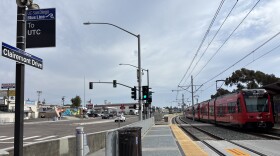MELISSA BLOCK, Host:
From NPR News, this is ALL THINGS CONSIDERED. I'm Melissa Block.
MICHELE NORRIS, Host:
And I'm Michele Norris.
It had been six months since President Bush visited parts of Mississippi and Louisiana devastated by Hurricane Katrina, but he was back today telling residents he saw progress and hope, and that he knew a lot of work still has to be done.
GEORGE W: One of the things I've heard loud and clear is that there's a continued frustration with the slowness of federal response at times. And therefore it is important for me to hear that.
NORRIS: The president mentioned several times that he and Congress had appropriated $110 billion for relief of Katrina-related costs. He also emphasized that the money had to be allocated at the local level, not in Washington, D.C.
BUSH: The federal government's role has been to write checks. The governor's role and the mayor's role is help to expedite the federal money to the local folks.
NORRIS: After stops in Long Beach and Biloxi, Mississippi, the president visited a school in New Orleans and met with a group of locally elected officials there. Among those traveling with the president today was NPR's Don Gonyea, and he joins us now from New Orleans.
Don, how would you describe the president's mood today as he went about this mission?
DON GONYEA: Well he met with a lot of people, some of it behind closed doors, but not all of it. In Mississippi this morning, along the Gulf Coast, he took a walking tour of a neighborhood that was hit very hard by Katrina, but there today it seems well on its way to recovery. It was the city of Long Beach. He greeted homeowners there who have gotten housing assistance to rebuild. We saw a lot of brand-new, nice brick homes. The president was casual. He was chatting with people. He seemed in very good spirits.
But it was also clear, especially from that first stop for the day, that the goal is to really promote the good news and to highlight progress.
NORRIS: The president, as he was traveling today, made several references to how much money had been appropriated for the Gulf Coast, strongly implying that his part of the government had held up its end of the bargain. Just how much of that $110 billion has really made its way south?
GONYEA: Well that's where a guy named Don Powell comes in. He was on Air Force One on the flight down today. He's the White House coordinator for Gulf Coast recovery. He ran the numbers. Of that $110 billion approved by the federal government, $86 billion has been committed already to projects, projects large and small. But again, he also points out that of that $86 billion, the amount that's actually been spent is just $53 billion.
So that's why when the White House, when hit with questions about how slow things are going, how frustrated people are, always points to the fact that it sent the money down here but now people need to go and get it.
NORRIS: Now back here in Washington we heard some of that frustration today. One of the Louisiana officials who was not part of the event today held a news conference of her own. And Don, I want to play you a little tape from Democratic Senator Mary Landrieu. This was her message for the White House.
MARY LANDRIEU: It's going to take more than words and more than visits. It's going to take action to get the job done.
NORRIS: Don, was that the attitude and the tone that was typical of the state and local officials that you saw today?
GONYEA: People were saying nice things down here today. But you do get a sense from people when I talked to some folks in the neighborhood the president was visiting today, at least in New Orleans, that they feel he has not made this a big enough public priority. Saying it was his first visit in six months. He didn't mention Hurricane Katrina in the State of the Union address.
That yes, he may have written that big $110-billion check, but you also hear from people that he hasn't followed through this in the big public way, in the way that he pledged when he spoke in Jackson Square just a short time after the storm hit in the fall of '05, when he promised that New Orleans will rise again.
NORRIS: Don, just very quickly, what was the significance of the choice, the location for the Samuel Green School, that charter school he visited?
GONYEA: First he's talking about the needs to have schools up and running so people feel comfortable to move back in. But it's also a way to promote charter schools. Half of the public schools are still closed, but those who had been opening have been primarily been charter schools. And they think that's the success story.
NORRIS: So a double message there?
GONYEA: Exactly.
NORRIS: Thank you, Don.
GONYEA: Bye.
NORRIS: That was NPR's Don Gonyea with the president on the Gulf Coast. Transcript provided by NPR, Copyright NPR.





